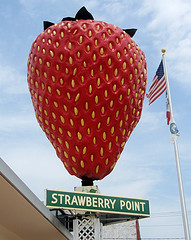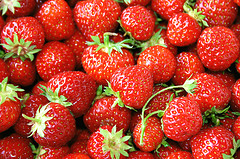
I admit it: I’m a worry wart. Among the myriad topics that can perturb me is the question: is it safe to eat a strawberry? Sure, strawberries are rich in Vitamin C: just eight of them contain more of the vitamin than a medium size orange, according to the California Strawberry Commission. But conventionally-grown strawberries also have high pesticide residues, according to the Pesticide Action Network and the U.S. Department of Agriculture Pesticide Data Program.
Let’s not forget, either, that 90 percent of the nation’s strawberries are grown in California, where conventional farms still fumigate the soil with ozone-depleting methyl bromide. That’s due to be phased out under the terms of the Montreal Protocol, only to be possibly replaced by methyl iodide, a known carcinogen and neurotoxin. (In fact, so harmful is it considered that dozens of distinguished scientists, including Nobel laureates, have petitioned the Environmental Protection Agency to prevent the registration of methyl iodide as a soil fumigant.)
The good news is that a new study shows that organic strawberries are not only tastier and more nutritious but also leave the soil healthier and with a more genetically diverse population of microorganisms. The study, led by soil scientist John Reganold of Washington State University in Pullman, Washington, compared strawberries from 13 pairs of adjacent organic and conventional fields from commercial farms in Watsonville, the dominant strawberry growing region of California. The scientists found that the organic farms produced strawberries with a longer shelf life and less susceptibility to post-harvest rot, despite not being sprayed with fungicides. That suggests that they have greater resistance to infection. Although the organic strawberries were significantly smaller than those from conventional farms, they also had more dry matter, or “more strawberry in the strawberry.”

The organic strawberries also had higher concentrations of Vitamin C and antioxidants than conventional berries, and anonymous testers found that one organic strawberry variety, known as “Diamante,” was sweeter and more flavorful than the same conventional variety. Significantly, the researchers found that organically managed soils also had higher concentrations of micronutrients and 159 percent more microbial biomass, most likely because fumigation with methyl bromide sterilizes the soil and kills all insects, nematodes (microscopic worms) and bacteria. Organic soils had greater genetic diversity, including genes for nitrogen fixation and pesticide degradation.
“Our findings have global implications,” says Reganold. “We also show you can have high quality, healthy produce without resorting to an arsenal of pesticides.”
Now, in unrelated strawberry news, Purdue University researchers have identified a variety that they believe would be particularly suitable for growing in space. The strawberries, dubbed “Seascape” are “day-neutral” meaning they aren’t sensitive to the length of available daylight to flower. Horticulture professor Cary Mitchell says that Seascape could qualify for the “salad machine,” a small growth unit that will provide fresh produce – including lettuces, radishes and tomatoes – to supplement traditional space meals. No word on whether the space strawberries will be organic.
Outsize strawberry image courtesy of Mykl Roventine
Small strawberry image courtesy of mwri
It’s great when science confirms your intuition and senses (tastebuds in this case), isn’t it? I choose organic fruit&veg because it tastes and ‘feels’ better – good to know that my subjectivity is confirmed by objective observations!
If forced to live in Space, though, I’ll happily compromise, because I’m a realist.
Hi Tim,
Thanks for your comments. The science on this has been a bit contradictory until now, so it’s good to see a rigorous study comparing organic to conventional produce. Frankly I can’t see why anyone would want to live in space, but if they do choose to do so then a handful of fresh strawberries would prove a pleasant diversion.
I too prefer organic not just for the taste but the effect. I cannot eat any kind of ready meal and am a recent discoverer of Halal meat which tastes completely different because the animal is slaughtered without stress and out of earshot from any other animals. But I did kind of plant too many cucumbers this year. Pickles anybody?